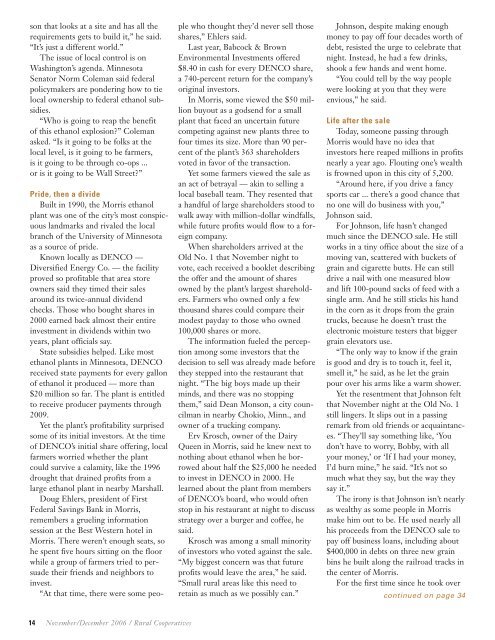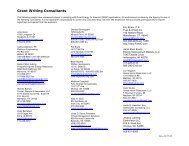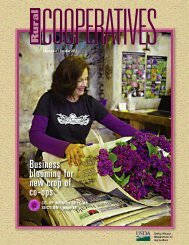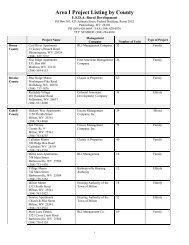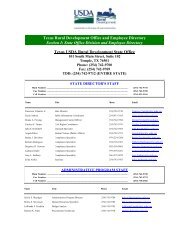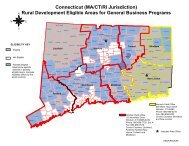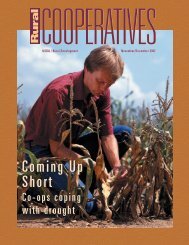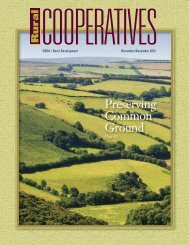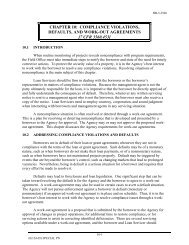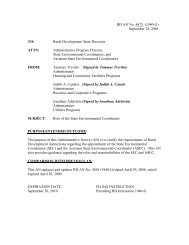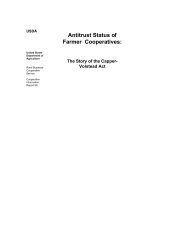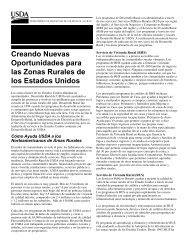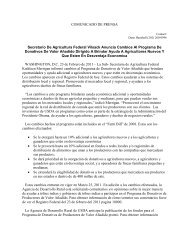How bike co-op went off track - USDA Rural Development - US ...
How bike co-op went off track - USDA Rural Development - US ...
How bike co-op went off track - USDA Rural Development - US ...
You also want an ePaper? Increase the reach of your titles
YUMPU automatically turns print PDFs into web optimized ePapers that Google loves.
son that looks at a site and has all the<br />
requirements gets to build it,” he said.<br />
“It’s just a different world.”<br />
The issue of local <strong>co</strong>ntrol is on<br />
Washington’s agenda. Minnesota<br />
Senator Norm Coleman said federal<br />
policymakers are pondering how to tie<br />
local ownership to federal ethanol subsidies.<br />
“Who is going to reap the benefit<br />
of this ethanol explosion?” Coleman<br />
asked. “Is it going to be folks at the<br />
local level, is it going to be farmers,<br />
is it going to be through <strong>co</strong>-<strong>op</strong>s ...<br />
or is it going to be Wall Street?”<br />
Pride, then a divide<br />
Built in 1990, the Morris ethanol<br />
plant was one of the city’s most <strong>co</strong>nspicuous<br />
landmarks and rivaled the local<br />
branch of the University of Minnesota<br />
as a source of pride.<br />
Known locally as DENCO —<br />
Diversified Energy Co. — the facility<br />
proved so profitable that area store<br />
owners said they timed their sales<br />
around its twice-annual dividend<br />
checks. Those who bought shares in<br />
2000 earned back almost their entire<br />
investment in dividends within two<br />
years, plant <strong>off</strong>icials say.<br />
State subsidies helped. Like most<br />
ethanol plants in Minnesota, DENCO<br />
received state payments for every gallon<br />
of ethanol it produced — more than<br />
$20 million so far. The plant is entitled<br />
to receive producer payments through<br />
2009.<br />
Yet the plant’s profitability surprised<br />
some of its initial investors. At the time<br />
of DENCO’s initial share <strong>off</strong>ering, local<br />
farmers worried whether the plant<br />
<strong>co</strong>uld survive a calamity, like the 1996<br />
drought that drained profits from a<br />
large ethanol plant in nearby Marshall.<br />
Doug Ehlers, president of First<br />
Federal Savings Bank in Morris,<br />
remembers a grueling information<br />
session at the Best Western hotel in<br />
Morris. There weren’t enough seats, so<br />
he spent five hours sitting on the floor<br />
while a group of farmers tried to persuade<br />
their friends and neighbors to<br />
invest.<br />
“At that time, there were some peo-<br />
14 November/December 2006 / <strong>Rural</strong> Co<strong>op</strong>eratives<br />
ple who thought they’d never sell those<br />
shares,” Ehlers said.<br />
Last year, Bab<strong>co</strong>ck & Brown<br />
Environmental Investments <strong>off</strong>ered<br />
$8.40 in cash for every DENCO share,<br />
a 740-percent return for the <strong>co</strong>mpany’s<br />
original investors.<br />
In Morris, some viewed the $50 million<br />
buyout as a godsend for a small<br />
plant that faced an uncertain future<br />
<strong>co</strong>mpeting against new plants three to<br />
four times its size. More than 90 percent<br />
of the plant’s 363 shareholders<br />
voted in favor of the transaction.<br />
Yet some farmers viewed the sale as<br />
an act of betrayal — akin to selling a<br />
local baseball team. They resented that<br />
a handful of large shareholders stood to<br />
walk away with million-dollar windfalls,<br />
while future profits would flow to a foreign<br />
<strong>co</strong>mpany.<br />
When shareholders arrived at the<br />
Old No. 1 that November night to<br />
vote, each received a booklet describing<br />
the <strong>off</strong>er and the amount of shares<br />
owned by the plant’s largest shareholders.<br />
Farmers who owned only a few<br />
thousand shares <strong>co</strong>uld <strong>co</strong>mpare their<br />
modest payday to those who owned<br />
100,000 shares or more.<br />
The information fueled the perception<br />
among some investors that the<br />
decision to sell was already made before<br />
they stepped into the restaurant that<br />
night. “The big boys made up their<br />
minds, and there was no st<strong>op</strong>ping<br />
them,” said Dean Monson, a city <strong>co</strong>uncilman<br />
in nearby Chokio, Minn., and<br />
owner of a trucking <strong>co</strong>mpany.<br />
Erv Krosch, owner of the Dairy<br />
Queen in Morris, said he knew next to<br />
nothing about ethanol when he borrowed<br />
about half the $25,000 he needed<br />
to invest in DENCO in 2000. He<br />
learned about the plant from members<br />
of DENCO’s board, who would often<br />
st<strong>op</strong> in his restaurant at night to discuss<br />
strategy over a burger and <strong>co</strong>ffee, he<br />
said.<br />
Krosch was among a small minority<br />
of investors who voted against the sale.<br />
“My biggest <strong>co</strong>ncern was that future<br />
profits would leave the area,” he said.<br />
“Small rural areas like this need to<br />
retain as much as we possibly can.”<br />
Johnson, despite making enough<br />
money to pay <strong>off</strong> four decades worth of<br />
debt, resisted the urge to celebrate that<br />
night. Instead, he had a few drinks,<br />
shook a few hands and <strong>went</strong> home.<br />
“You <strong>co</strong>uld tell by the way pe<strong>op</strong>le<br />
were looking at you that they were<br />
envious,” he said.<br />
Life after the sale<br />
Today, someone passing through<br />
Morris would have no idea that<br />
investors here reaped millions in profits<br />
nearly a year ago. Flouting one’s wealth<br />
is frowned upon in this city of 5,200.<br />
“Around here, if you drive a fancy<br />
sports car ... there’s a good chance that<br />
no one will do business with you,”<br />
Johnson said.<br />
For Johnson, life hasn’t changed<br />
much since the DENCO sale. He still<br />
works in a tiny <strong>off</strong>ice about the size of a<br />
moving van, scattered with buckets of<br />
grain and cigarette butts. He can still<br />
drive a nail with one measured blow<br />
and lift 100-pound sacks of feed with a<br />
single arm. And he still sticks his hand<br />
in the <strong>co</strong>rn as it dr<strong>op</strong>s from the grain<br />
trucks, because he doesn’t trust the<br />
electronic moisture testers that bigger<br />
grain elevators use.<br />
“The only way to know if the grain<br />
is good and dry is to touch it, feel it,<br />
smell it,” he said, as he let the grain<br />
pour over his arms like a warm shower.<br />
Yet the resentment that Johnson felt<br />
that November night at the Old No. 1<br />
still lingers. It slips out in a passing<br />
remark from old friends or acquaintances.<br />
“They’ll say something like, ‘You<br />
don’t have to worry, Bobby, with all<br />
your money,’ or ‘If I had your money,<br />
I’d burn mine,” he said. “It’s not so<br />
much what they say, but the way they<br />
say it.”<br />
The irony is that Johnson isn’t nearly<br />
as wealthy as some pe<strong>op</strong>le in Morris<br />
make him out to be. He used nearly all<br />
his proceeds from the DENCO sale to<br />
pay <strong>off</strong> business loans, including about<br />
$400,000 in debts on three new grain<br />
bins he built along the railroad <strong>track</strong>s in<br />
the center of Morris.<br />
For the first time since he took over<br />
<strong>co</strong>ntinued on page 34


